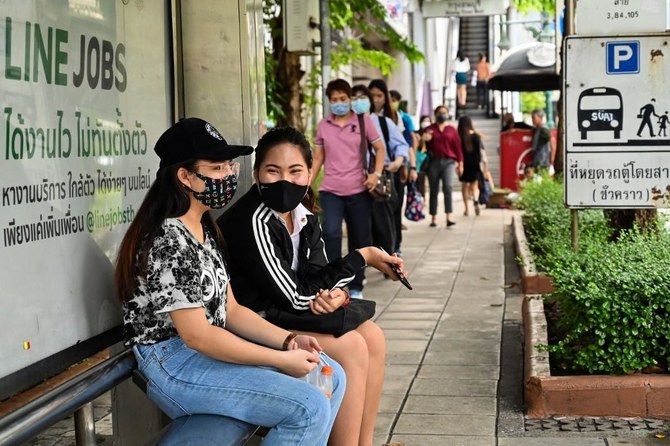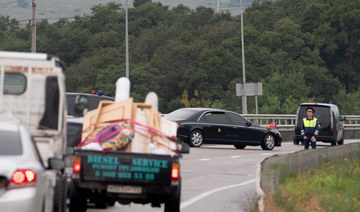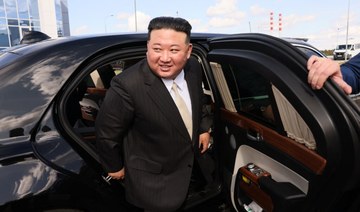BANGKOK, Thailand: Thailand on Monday reported three new coronavirus cases, all imported, marking 28 days without local transmission, a senior official said.
The three new cases were Thai nationals returning from India and were detected in state quarantine, said spokesman for the government’s Center for COVID-19 Situation Administration, Taweesin Wisanuyothin.
Thailand has so far recorded 58 deaths related to COVID-19 among 3,151 infections, of which 3,022 patients have recovered.
Taweesin said the administration was coordinating with Myanmar authorities regarding 23 coronavirus cases found among migrants deported from Thailand.
Thailand reports 3 new imported coronavirus cases; 28 days without local transmission
Thailand reports 3 new imported coronavirus cases; 28 days without local transmission

- The administration was coordinating with Myanmar authorities regarding 23 coronavirus cases found among migrants deported from Thailand
- Thailand has so far recorded 58 deaths related to COVID-19 among 3,151 infections
Ukraine says destroys Russian missiles over Kyiv

- Russia’s repeated attacks across Ukraine are depleting the country’s air defense
- Ukraine has since the start of the war strengthened air defense over the capital
Russia’s repeated attacks across Ukraine are depleting the country’s air defense, prompting President Volodymyr Zelensky to plead for aid from allies.
“Missiles came at Kyiv from the south in several waves. Almost simultaneously enemy attack drones were moving toward the capital from the same southern direction,” the Kyiv administration said.
AFP journalists heard at least one explosion in the capital, where the air raid alert lasted two hours.
A fire broke out due to a strike in the Kyiv region, injuring a man, the national police said.
Overall Russia launched 24 drones and six missiles across the country, the air defense said.
Ukraine has since the start of the war strengthened air defense over the capital, where attacks usually make little damage.
Zelensky has however recently called for several additional Patriot systems, including two to defend the eastern Kharkiv region bordering Russia.
US media reported that the United States will send another Patriot missile air defense system to Ukraine in the coming days.
North Korea’s Kim hails Russia ties ahead of likely Putin visit

- Kim Jong Un made a rare overseas trip to meet Vladimir Putin in Russia’s far east last year
- Russian leader expected to pay a return visit to North Korea in the coming days
SEOUL: North Korean leader Kim Jong Un on Wednesday hailed his country’s ties with Russia, saying the two nations were “invincible comrades-in-arms,” amid reports President Vladimir Putin will visit Pyongyang imminently.
Kim made a rare overseas trip to meet Putin in Russia’s far east last year, with Seoul and Washington subsequently claiming Pyongyang was shipping weapons to Moscow for use in Ukraine, violating UN sanctions, in return for technical help with its satellite program.
Putin was expected to pay a return visit to North Korea in the coming days, after the Kremlin told Russian media in May that the trip was “being prepared.”
South Korea’s Yonhap news agency reported the visit could take place “as early as next week,” as part of a tour that would also include a stop in Vietnam.
Ties between North Korea and Russia have “developed into an unbreakable relationship of comrades-in-arms,” leader Kim wrote in a message to Putin carried in the official Korean Central News Agency Wednesday.
Their “meaningful” ties will “further consolidate the eternal milestone” in the new era, Kim added, according to KCNA.
Yonhap said that satellite images showed possible signs of a “large structure” being installed in Pyongyang’s Kim Il Sung Square.
Such activity has previously been observed when North Korea was preparing for large-scale events in the capital, such as military parades or visits by high-ranking foreign figures, according to Yonhap.
When he visited Putin last year, Kim said the North’s ties with Moscow were his country’s “number one priority.”
Analysts have also warned that ramped-up testing and production of artillery and cruise missiles by the nuclear-armed North could be in preparation for shipments to Russia for use in Ukraine.
North Korea is barred by UN sanctions from any tests using ballistic technology, but Moscow used its UN Security Council veto in March to effectively end UN monitoring of violations, for which Pyongyang has specifically thanked Russia.
North Korea has denied the allegations that it is shipping weapons to Russia, calling the claim “absurd.”
However, a pentagon report last month said Russia is using North Korean ballistic missiles in Ukraine, citing debris analysis.
Experts said that during Putin’s visit to Pyongyang, North Korea would likely push to export more war materials to be used in the Ukraine war, in exchange for importing food and energy from Russia.
There is a “disparity in the threat perception between what’s happening in Ukraine — an actual, visible conflict — and what’s happening in North Korea — the possibility of a crisis, which may seem distant when compared to the realities of the Russia-Ukraine war,” Soo Kim, a former CIA analyst, said.
“This plays to both Putin and Kim’s advantage, obviously, as Putin, who’s currently embroiled in the war and is pressed to receive help in his war efforts, and Kim is keen to build out his weapons program further,” she added.
No Muslim representation in India’s cabinet as Modi starts third term

- No Muslim representation in India’s government as Modi starts third term
- Re-elected FM says will focus on border issues with China and Pakistan
NEW DELHI: Indian Prime Minister Narendra Modi has retained most of the Cabinet ministers for his third term in office, signaling policy continuity, experts say, as they forecast a more conciliatory approach toward minorities.
Modi named the members of his government on Monday, one day after being sworn in following a mammoth general election, which ran from mid-April until June.
External Affairs Minister Subrahmanyam Jaishankar remains in charge of India’s foreign policy, Amit Shah has stayed as home minister, Nirmala Sitharaman as finance minister, and Rajnath Singh as defense minister.
The first minister to comment after his re-appointment was Jaishankar, who told reporters on Tuesday that the “foreign policy of Modi 3.0” will focus on resolving border issues with China and, on finding a solution to the “issue of years-old cross-border terrorism” with Pakistan.
Nuclear-armed India and China share a 3,800 km border over which they fought a war in 1962. Since 2020, they have engaged in a military standoff on the border — the worst in five decades.
With Pakistan, also a nuclear-armed neighbor, India has fought three wars, including two over control of the disputed Kashmir region in the Himalayas.
“The message from the way the cabinet has been formed and the way Dr. Jaishankar continues as the foreign minister means that the previous approach of marginalizing Pakistan in the Indian foreign policy and standing up to China will continue,” Prof. Harsh V. Pant, vice president of the Observer Research Foundation in New Delhi, told Arab News.
“Also, the way India has been reactive on the global stage is again something that is again likely to continue, so India will continue to find its own space in the global order through active diplomacy as it has tried to do in the last one decade.”
Despite becoming the second Indian prime minister to win a third term, Modi had to rely on regional allies to form his Cabinet.
The BJP won 240 seats in the 543-member parliament, losing its absolute majority for the first time since 2014. It was able to form a government with the support of two coalition members — the Telugu Desam Party, a player in the southern state of Andhra Pradesh, and the Janata Dal (United) party from the eastern state of Bihar.
Their National Democratic Alliance controls 293 seats, while 272 were needed to form the government.
None of the key ministries went to the coalition partners.
“Practically no portfolio has changed except that the civil aviation has gone to the TDP but by and large all the crucial posts are with the BJP,” said R. Jagannathan, editorial director of the Hindu nationalist Swarajya magazine.
“I think the coalition people cannot expect more than their proportionate share of seats in the coalition. They don’t have that many seats to demand so much more ... The coalition will not have an impact in terms of the ministries they control, they will have an impact behind the scenes. They will get the Modi government to do many things for their states, mainly Bihar and Andhra Pradesh.”
The Modi “3.0” Cabinet saw representation from across states and castes but not for the 200 million Muslim minority.
A champion of the Hindu majority, who make up 80 percent of India’s 1.4 billion population, Modi has been widely criticized for undermining India’s secular democracy with a majoritarian agenda, which has facilitated violent attacks by Hindu nationalists against minorities, particularly Muslims.
For Venkat Narayana, former professor of economics at the Kakatiya University Telangana state, the lack of Muslim representation in Modi’s government was a “signal that he would continue with his non-secular approach and his anti-minority politics remain as pronounced as in the previous two terms.”
But since the 2024 election has been seen as a comeback of India’s opposition with 232 parliament seats, the prime minister will have to be “more conciliatory and democratic this time,” Narayana said.
“He can’t afford to shut the opposition completely now. He cannot run the government with the hardcore agenda otherwise the government will collapse.”
Prof. Ajay Gudavarthy from the Centre for Political Studies at Jawaharlal Nehru University in New Delhi told Arab News that the BJP’s alliance partner TDP has “a fair share of Muslim backing,” so there must be an agreement regarding that.
“The BJP this time might not go for some of the radical agendas like mob lynching which was followed in the previous terms. But they will follow a more cultural majoritarian agenda,” he said.
“Let’s wait and watch.”
Suspected militant killed, seven wounded in Kashmir clashes

SRINAGAR: A suspected militant was killed and seven security personnel were wounded in clashes in Indian-administered Kashmir, police said Wednesday.
The first incident occurred late Tuesday night in Hiranagar, a village near the frontier with Pakistan which, like India, claims the Himalayan region in full.
Security forces rushed to the border village, with a man killed in the resulting gunfight who police believed had crossed over from the Pakistan side.
“This appears to be a fresh infiltration in which one terrorist was killed and the search for one more is ongoing,” Anand Jain, a top police officer told reporters.
Hours later, suspected rebels lobbed grenades and fired at an army checkpoint in the remote Doda area around 100 kilometers (60 miles) to the north, leaving six soldiers and a police officer wounded.
Six of the wounded were transported to hospital for treatment, police senior superintendent Javaid Iqbal told AFP.
“A search operation is on in the forest area,” he added.
The incidents came days after a gunman opened fire bullets on a bus full of Indian pilgrims returning from a Hindu shrine in the southern Kashmir district of Reasi, leaving nine dead and dozens wounded.
Survivors at a hospital told AFP on Tuesday that the attacker continued firing on the bus for several minutes after it tumbled down into a ravine.
Army special forces and police have launched a manhunt in a vast forested area and released a sketch of the attacker, announcing a reward of $24,000 for information leading to his location.
India has around 500,000 soldiers permanently deployed in Kashmir.
The three back-to-back incidents follow an uptick in militant attacks in the southern Hindu-dominated areas of the Muslim-majority territory.
Kashmir has been divided between India and Pakistan since their independence from British rule in 1947, and the rivals have fought three wars over control of the territory.
Since 1989 rebel groups have waged a violent insurgency, demanding independence for Kashmir or its merger with Pakistan.
The conflict has left tens of thousands of civilians, soldiers, and rebels dead.
Clashes between rebels and soldiers have drastically reduced since 2019, when Prime Minister Narendra Modi’s government revoked the limited constitutional autonomy of the Indian-controlled part of Kashmir.
India regularly accuses Pakistan of supporting and arming the rebels, a charge Islamabad denies.
8 people with possible Daesh ties arrested in US on immigration violations

- Individuals from Tajikistan entered the country last spring and passed through the US government’s screening process
- FBI and Department of Homeland Security issued a statement confirming the immigration-related arrests of “several non-citizens”
WASHINGTON: Eight people from Tajikistan with suspected ties to the Daesh group have been arrested in the United States in recent days, according to multiple people familiar with the matter.
The arrests took place in New York, Philadelphia and Los Angeles and the individuals, who entered the US through the southern border, are being held on immigration violations, said the people, who were not authorized to discuss the ongoing investigation by name and spoke to The Associated Press on condition of anonymity.
The nature of their suspected connections to Daesh was not immediately clear, but the individuals were being tracked by the FBI’s Joint Terrorism Task Force, or JTTF. They were in the custody of US Immigration and Customs Enforcement, which made the arrests while working with the JTTF, pending proceedings to remove them from the country.
The individuals from Tajikistan entered the country last spring and passed through the US government’s screening process without turning up information that would have identified them as potential terrorism-related concerns, said one of the people familiar with the matter.
The FBI and Department of Homeland Security issued a statement confirming the immigration-related arrests of “several non-citizens” but did not detail specifics. The agencies noted that the US has been in a “heightened threat environment.”
FBI Director Christopher Wray has said the US is facing accelerating threats from homegrown violent extremists as well as foreign terrorist organizations, particularly in the aftermath of the Oct. 7 attack by Hamas on Israel.
He said at one recent congressional hearing that officials were “concerned about the terrorism implications from potential targeting of vulnerabilities at the border.” The Biden administration in August said that it had detected and stopped a network attempting to smuggle people from Uzbekistan into the US and that at least one member of the network had links to a foreign terrorist group.
“The FBI and DHS will continue working around the clock with our partners to identify, investigate, and disrupt potential threats to national security,” the agencies said.














